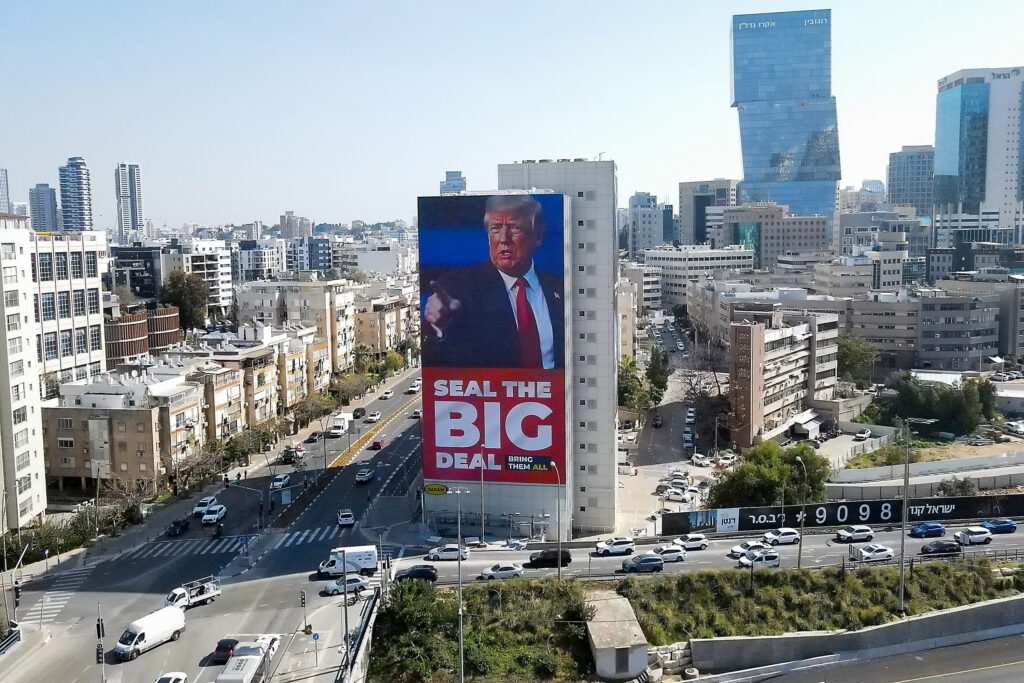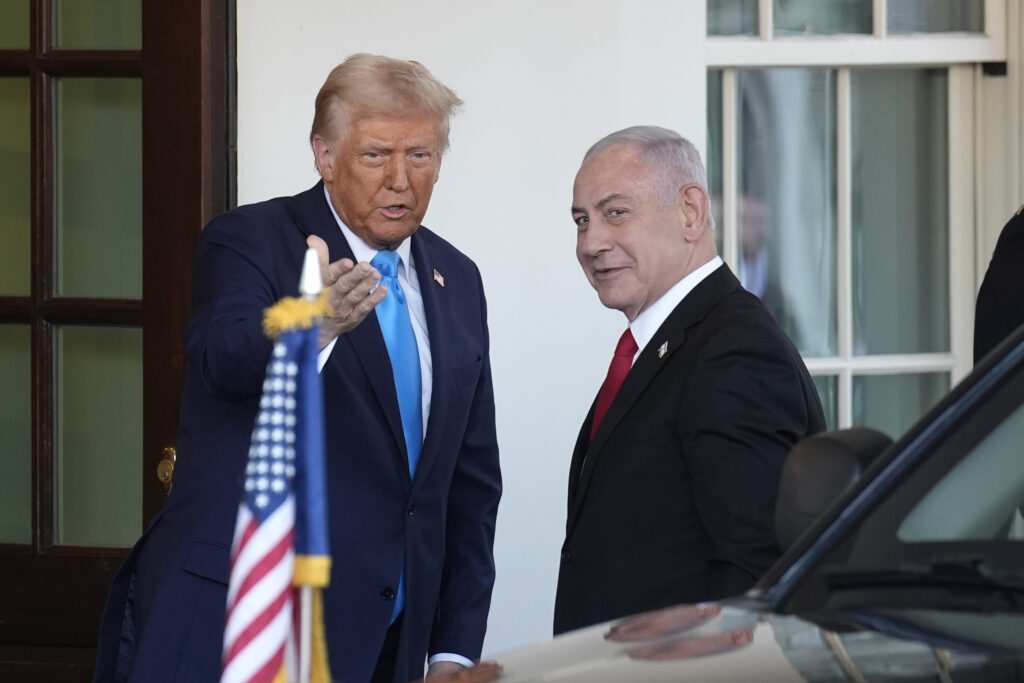President Donald Trump proposed the U.S. taking over the Gaza Strip and assuming responsibility for reconstructing the war-torn territory during a press conference with Israeli Prime Minister Benjamin Netanyahu.
“The U.S. will take over the Gaza Strip,” Trump said at the White House on Tuesday. “We’ll own it and be responsible for dismantling all of the dangerous unexploded bombs and other weapons on the site. Level the site, and get rid of the destroyed buildings, level it out, create an economic development that will supply unlimited numbers of jobs and housing for the people of the area.”

Trump suggested he would be open to deploying U.S. troops to secure the area, saying he would “do what is necessary,” and added that he saw the U.S. presence in the contested territory as a “long-term ownership position.” The long-time New York real estate developer painted a vision of a “Riviera of the Middle East” with “world class” construction projects.
Netanyahu seemed to entertain but stop short of fully endorsing the proposal, which, if pursued, would represent a dramatic new U.S. intervention in the Middle East and upend decades of foreign policy doctrine. The Israeli prime minister described Trump’s proposal as “a different idea” from his own but one “worth paying attention to.”
“We’re talking about it, he’s exploring it with his people, with his staff. I think it’s something that could change history,” Netanyahu said. “And it’s worthwhile really pursuing this avenue.”
Trump also repeated calls for other nations in the region to take in Palestinians from the Gaza Strip, despite neighboring countries stating publicly they were not interested in doing so.
“It should not go through a process of rebuilding and occupation by the same people that have really stood there and fought for it and lived there and died there and lived a miserable existence there,” Trump said. “Instead, we should go to other countries of interest with humanitarian hearts, and there are many of them, that want to do this, and build various domains that will ultimately be occupied by the 1.8 million Palestinians living in Gaza, ending the death and destruction and frankly bad luck.”

Trump also said he would visit Israel, Saudi Arabia, and the Gaza Strip during upcoming foreign travel.
Earlier in the Oval Office, Trump said “really rich” nations will supply land, and several areas could be built to permanently house Palestinians “where they can live a beautiful life.” He suggested the new developments would be nice enough that Palestinian refugees would not want to return to their homeland.
Pressed on whether the U.S. could help secure a deal that normalizes ties between Saudi Arabia and Israel without the Palestinian state, Trump expressed confidence that the Saudis would back the proposal, suggesting that they and other nations would welcome a fresh approach to addressing the conflicts in the region.
“Saudi Arabia is going to be very helpful and they have been very helpful,” Trump said. “But everybody feels that continuing the same process that’s gone on forever, over and over again, and then it starts and then the killing starts, and all of the other problems start. And you end up in the same place, and we don’t want to see that happen.”
Netanyahu said he believed “peace between Israel and Saudi Arabia is not only feasible, I think it’s going to happen.”
Trump’s proposal all but sweeps away decades of U.S. policy in support of Palestinian statehood, including during his first term, when he once said “I like the two-state solution.” The status of Palestinians in Gaza and in the West Bank, as well as refugees in Jordan, Lebanon and Syria, had been expected to be settled somewhere within that future state.
But the prospects for Palestinian statehood have rarely appeared so remote, with Netanyahu’s government now pledging it will never happen. Some of Netanyahu’s hard-right supporters in Israel have previously called for clearing all Palestinians out of Gaza and making it an extension of the Jewish state.
Trump’s meeting with Netanyahu takes place at a pivotal moment, as negotiators attempt to broker the next phase of an agreement that could bring an end to the war in Gaza. Much of the enclave is in ruins after Israel’s 15-month war in response to the Hamas attacks of Oct. 7, 2023, which is now in a six-week ceasefire.
Trump has repeatedly said he’d like to see the Gaza Strip cleared out in the wake of Israel’s devastating military campaign against the territory.
The idea faces long odds. Egypt and Jordan as well as the Arab League have pushed back on Trump’s idea, as have Saudi Arabia, the United Arab Emirates, Qatar and the Palestinian Authority itself. Asked about the fact that Jordan has swatted down the idea, Trump pointed to Venezuela, which recently agreed to take back deportees from the U.S. after refusing for a year.
“Look, the Gaza thing has not worked,” Trump told reporters in the Oval Office earlier in the day. “I think they should get a good, fresh, beautiful piece of land, and we get some people to put up the money to build it and make it nice and make it habitable, and enjoyable, somewhere.”
“I don’t know how they can want to stay,” Trump said. “It’s a demolition site. It’s a pure demolition site.”
Jared Kushner, Trump’s son-in-law and founder of investment firm Affinity Partners, drew attention last year when he said the Gaza Strip could be “very valuable.”
“Gaza’s waterfront property, it could be very valuable, if people would focus on building up livelihoods,” he said in an interview posted by Harvard University’s Middle East Initiative.
Kushner, whose firm is backed by investors in Saudi Arabia, Qatar and Abu Dhabi, later clarified in a post on X that he was expressing “my dismay that the Palestinian people have watched their leaders squander decades of Western aid on tunnels and weapons rather than on improving their lives.”
Israel and Hamas remain far apart on crucial issues. Netanyahu has pledged to achieve total victory over Hamas, designated a terrorist group by the U.S., and return all the hostages taken in the group’s assault on Israel that started the war. Some right-wing members of Netanyahu’s coalition have been critical of the deal and have pressured him to resume the war.
Hamas has said it will not release Israeli hostages in a second stage of the ceasefire unless Netanyahu agrees to end the war and pull Israeli forces out of the Gaza territory it controls.
Trump has offered unorthodox solutions to ending the conflict. The U.S. president has been outspoken in supporting Israel but has also pledged to wind down the conflict and took credit for the deal, which was agreed to during the final days of his predecessor Joe Biden’s presidency.
“They will never give me a Nobel Peace Prize,” Trump said. “I deserve it but they will never give it.”
___
© 2025 Bloomberg L.P
Distributed by Tribune Content Agency, LLC.



